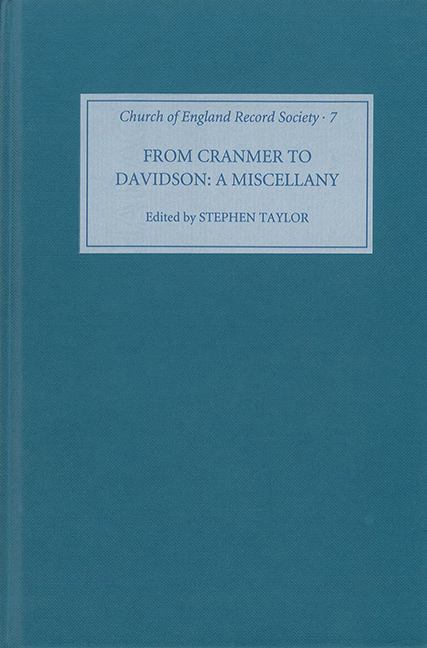Book contents
- Frontmatter
- Dedication
- Contents
- Preface
- Abbreviations
- 1 Thomas Cranmer and the Metropolitical Visitation of Canterbury Province 1533-1535
- 2 Edward Brocklesby: ‘The First Put Out of his Living for the Surplice’
- 3 Richard Montagu: ‘Concerning Recusancie of Communion with the Church of England’
- 4 Petitions for Episcopacy and the Book of Common Prayer on the Eve of the Civil war 1641-1642
- 5 Bishop Edmund Gibson's Proposals for Church Reform
- 6 Samuel Horsley: ‘Thoughts on Civil Government’
- 7 W. J. Conybeare: ‘Church Parties’
- 8 Randall Davidson: A Partial Retrospective
- Index
- Church of England Record Society: COUNCIL AND OFFICERS FOR THE YEAR 1998-99
7 - W. J. Conybeare: ‘Church Parties’
Published online by Cambridge University Press: 14 August 2020
- Frontmatter
- Dedication
- Contents
- Preface
- Abbreviations
- 1 Thomas Cranmer and the Metropolitical Visitation of Canterbury Province 1533-1535
- 2 Edward Brocklesby: ‘The First Put Out of his Living for the Surplice’
- 3 Richard Montagu: ‘Concerning Recusancie of Communion with the Church of England’
- 4 Petitions for Episcopacy and the Book of Common Prayer on the Eve of the Civil war 1641-1642
- 5 Bishop Edmund Gibson's Proposals for Church Reform
- 6 Samuel Horsley: ‘Thoughts on Civil Government’
- 7 W. J. Conybeare: ‘Church Parties’
- 8 Randall Davidson: A Partial Retrospective
- Index
- Church of England Record Society: COUNCIL AND OFFICERS FOR THE YEAR 1998-99
Summary
Introduction
By the close of the twentieth century, the mid-nineteenth-century Church of England will have been the subject of both academic and popular historical writing for some 150 years. For much of this period, the prevailing approach to the study of the history of Victorian anglicanism has been to understand it in terms of the development, character and impact of ‘church parties'.
This is hardly an original comment. The same point is made in many of the 'historiographical surveys’ which preface recent scholarly studies of the Victorian church. Such discussions in particular emphasize the enduring hegemony of a high-church, ‘tractarian'/'anglo-catholic’ tradition which dominated anglican historiography from the mid-nineteenth century until the 1950s. For historians working in this tradition, the most important theme in the history of the Victorian church was the impact of the Oxford movement, with 1833 (the date of Keble's famous assize sermon, singled out by Newman himself as the ‘year 0’ of the tractarian tradition in the Apologia pro vita sua) treated as a date of epochal significance. Even for those not drawn to the Oxford movement in a search for their own theological roots, the topic has exercised an almost irresistible fascination. No-one could deny the intrinsic interest of the colourful and dramatic sequence of controversies and clashes which accompanied the development first of tractarianism and subsequently of ritualism; the importance of understanding a movement which had significant ramifications for other cultural, intellectual and political phenomena of the mid- to late nineteenth century, or the challenge of interpreting the complex and powerful personalities who provided the movement's leadership, above all John Henry Newman. Laurence Crumb has compiled two substantial bibliographical volumes listing the accumulated mass of printed primary sources and secondary studies of the Oxford movement and its leaders which have appeared at regular intervals since the mid-nineteenth century, with particular concentrations around suitable anniversaries, above all the centenary and the 150th anniversary of the assize sermon.
Alongside the anglo-catholic traditions in interpretation and subject-matter, however, there has also long been a significant evangelical strain of historiography.
- Type
- Chapter
- Information
- From Cranmer to DavidsonA Church of England Miscellany, pp. 213 - 386Publisher: Boydell & BrewerPrint publication year: 1999



